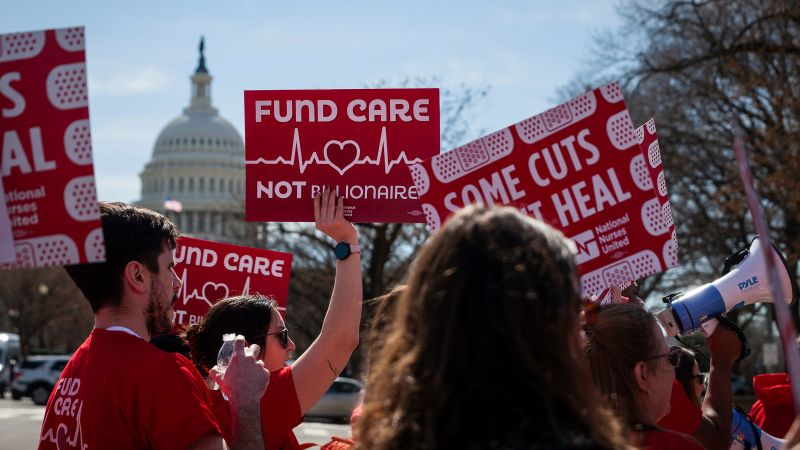President Donald Trump, along with congressional Republicans, may have shifted their rhetoric away from an immediate repeal of the Affordable Care Act (ACA—often referred to as Obamacare), but their strategies to undermine the landmark health reform continue unabated. Unlike the fervent attempts at repeal seen in 2017, the primary focus of the Republicans this year has been on promoting Trump’s ambitious domestic agenda while downplaying direct references to Obamacare. This change in strategy reflects a calculated approach to shift the narrative without drawing legislative attention to a long-standing health policy debate that had previously resulted in adverse electoral consequences.
In recent legislative actions, Republicans succeeded in implementing significant changes that stand to weaken the Affordable Care Act. Key provisions from Trump’s comprehensive legislative package, dubbed the “big, beautiful bill,” target various aspects of the ACA, including Medicaid expansion. These changes are expected to lead to an increase in the number of uninsured individuals, raise the costs for those who remain under Obamacare insurance plans, and reverse years of progress in reducing the uninsured rate in the U.S. Experts estimate that these alterations could instigate a loss of health coverage for millions and return established gains to the pre-Obamacare era.
Moreover, Trumps’ reforms impose additional stipulations for Medicaid, such as requiring low-income adults to work or volunteer a minimum of 80 hours monthly to qualify for insurance. Larry Levitt of KFF (Kaiser Family Foundation) points out that the overall impact of these alterations amounts to a partial repeal of the ACA, which poses significant repercussions for health access for the country’s most vulnerable populations.
Another critical issue is the potential expiration of enhanced federal premium subsidies that arose during the Biden administration in 2021. As Congress reconvenes after the summer break, debate over whether to extend these subsidies is looming, as their cessation could result in skyrocketing premium payments, thereby driving countless individuals to abandon their coverage altogether. Some Republicans are beginning to recognize the potential fallout from allowing these subsidies to lapse, particularly knowing that many red-state residents would suffer significantly.
Historically, the Republicans’ approach to health care issues has been contentious, suffering political backlash, notably in the 2018 midterms where efforts to repeal the ACA were pivotal in Democratic victories. This time around, however, the GOP seems to have adopted a more subdued stance on Obamacare, possibly aiming to sidestep a repeat of past electoral repercussions. Nonetheless, the technical nature of many proposed changes might obscure their implications from the general populace, as pointed out by health policy experts who warn that the effects might not be felt until years later.
The new legislation introduces ambivalent changes that complicate enrollment and renewal processes for ACA coverage. Verification requirements have been increased for enrollees, and subsidies will be restricted for legal immigrants under specific circumstances, rendering it easier for individuals to slip through the cracks of the health care system. Consequently, this regulatory tightening has the potential to cause substantial drops in coverage among the previously insured, particularly in Republican-led states like Florida, Texas, and Georgia.
Furthermore, the Congressional Budget Office predicts that by 2034, an additional 2.1 million individuals will likely find themselves uninsured, as the markers of coverage become more restrictive. Jennifer Sullivan from the Center on Budget and Policy Priorities warns of the consequent weakening of health market offerings, raising concerns about future enrollment viability and the market’s ability to maintain balanced participation.
Supporters of these reforms argue that they aim to reduce fraud and waste by implementing stricter verification processes. Brian Blase, affiliated with the right-leaning Paragon Health Institute, asserts that the intention of the new law is not to dismantle but to improve the ACA’s integrity—countering claims of undermining the program. This perspective emphasizes the importance of addressing alleged abuses within the enrollment system, highlighting bipartisan concerns over the need for validity in health care support.
Nevertheless, the sweeping alterations introduced by the new law have left many stakeholders anxious about the accessibility and affordability of health insurance under the ACA. For instance, enrollees must now verify their incomes each year or risk losing federal assistance, and conditions that have favored automatic reenrollment have been curtailed. The implications are significant, involving potential increases in coverage costs and administrative burdens that could further contribute to disenchanted consumers abandoning the system.
Legal challenges against the enactment of the rule are already underway, fueled by Democratic-led states and advocacy groups asserting that the changes will exacerbate the potential for increased uninsured rates. Insurer responses to these shifts in policy bear direct consequences for consumers, with median premium hikes predicted for 2026, amid a sense of urgency as reductions in federal support loom. Experts warn that what lies ahead could be turbulent years for both insurance providers and consumers navigating the evolving landscape of health care coverage.
As the conflict over healthcare policy persists, the ramifications of these legislative changes will not only impact immediate coverage outcomes but will also play a significant role in shaping the future discourse surrounding health care reform in the United States.











